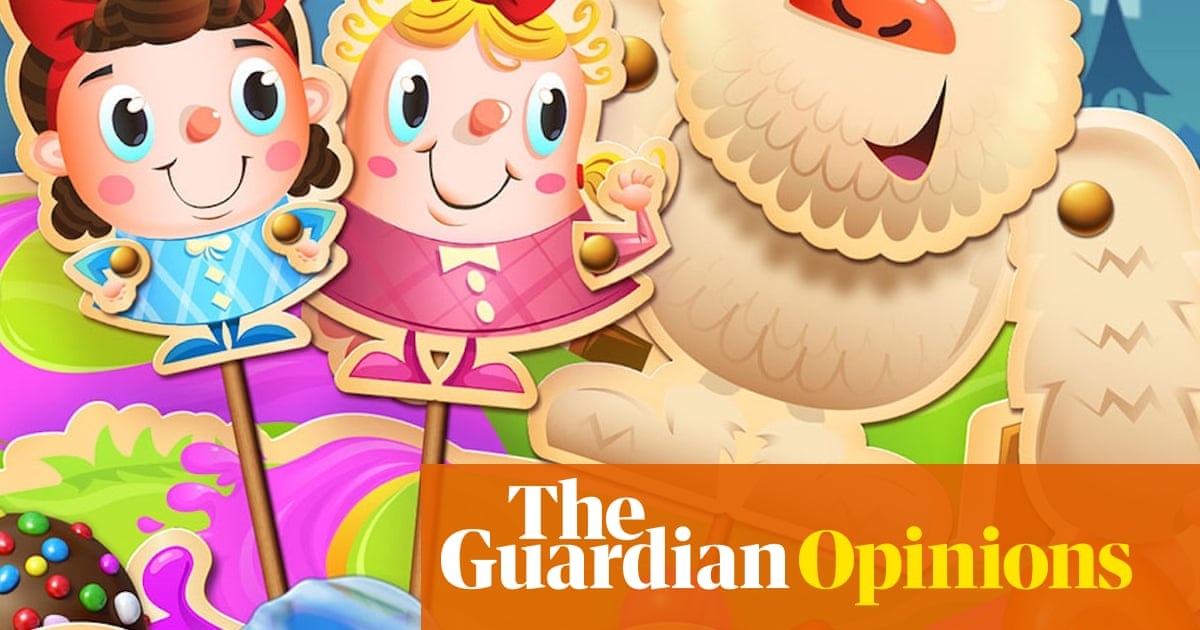As long as I can remember, my wife has started each day with 30 minutes of a Candy Crush game. As long as she can remember, I have started each day by telling her it is pointless casual gamer cack. Now I write for the Guardian, I need to find a more eloquent way of putting that, so I thought I would have a go myself. I am begging you: do not do the same. Candy Crush Soda Saga nearly ruined me in a week.
I like the game mechanics. As Oscar Wilde said, the man who doesn’t love sliding stuff to form chains of three or more matching shapes does not love life itself. This one is wrapped in a cute candy veneer, all fizzy bottles and gummy bears. And that makes the visuals so alluring. When you slide a Colour Bomb into a Candy Fish all the candies that colour get Candyfished and your eyes are treated to a bazillion of them fizzing around the screen destroying everything, while the firm yet gentle haptic feedback makes it a multisensory burst of pure, effervescent joy.
“What’s that clicking noise?” my wife asks.
“Don’t you play it with the haptic feedback on?”
“Oh, I turned that off because I thought it was hurting my phone.”
“In what way?”
“I felt it was putting too much … pressure on it.” She says, like her phone is the USS Enterprise and she is Scotty diverting a dangerous amount of power away from the shields.
We had many chats about Candy Crush while we both played the game in bed. I’m all for increased interspousal communication, but we used to do this kind of thing with broadsheet newspapers and now we’re matching jelly beans on phones. Luckily, you just need one hand to play, so the other is free to punch yourself repeatedly in the face as you realise how pointless your life has become.
Sign up toPushing Buttons
Keza MacDonald's weekly look at the world of gaming
after newsletter promotion
And this game is utterly pointless in the long run. There is no story, no real achievements. It uses a board game path to fake big-time progression, but whether it’s me on level 150 or my wife on level 8,452 (gulp!) the pattern is the same: a few easy levels then a super hard one which, if you haven’t accumulated enough power-ups, is virtually impossible.
That’s when the game drops its trousers and flashes its microtransactions. And by that stage you are so hooked by the mechanics and the colour you hand over your few quid for some extra virtual visual bobbins quicker and easier than those crazy kids getting drugs in The Wire. Oh yes! Candy Crush Soda Saga is the game Stringer Bell went to business school to invent. The cigarette was once hailed as the most efficient poison delivery system ever invented. Not now.
This game “suggests” moves to you. These are frequently not the best ones. That is no accident. This is a game designed to make you fail. It’s a compulsion loop, sure, but one that encourages you to pay for the pleasure. It’s not gambling per se, because you know what you are buying, but, while gambling company ads nowscreamabout setting limits and walking away, this game screams at you to have one more go.
I have been addicted to so many things in my life that I stopped counting. (I became addicted to counting my addictions as well.) But this ranks as one of the worst. It only takes three days until I am dangerously hooked. Last Sunday I played Candy Crush Pop Saga for three solid hours. I nearly missed theScottish Cup finalas a result. Unlike my wife, I was dipping into it during the rest of the day as well, thinking, “Oh it’s been 15 minutes, I may have ended up getting a power-up via the Bake a Cake sub game my Candy Crush team are helping me with.”
The self-loathing of the addict envelopes me. I know this is not nurturing me in any way, but I cannot stop. At least cocaine was quick. In terms of time? In one week I wasted what could have been, in Zelda terms, one third of a Breath of the Wild, one half of a Twilight Princess or an entire Majora’s Mask. And at least they tell stories. If the deadline for this article hadn’t made me stop, I would have had to have buried my phone in a lime pit and set it on fire to escape from Candy Crush.
The irony is that there’s no real difference between this and the arcade offerings that made me fall in love with gaming as child. Pacman, Frogger, Space Invaders et al were all designed to make you pump another coin in the slot when it winked CONTINUE Y/N at you. They were even more repetitive. So I guess by the definition detailed in this Candy Crush castigation, those games were also a waste of time.
But why didn’t they feel like that?
Because back then, all I had was time. It wasn’t the dwindling commodity it is in my 50s. Maybe if I played Galaxian now it would feel like playing Candy Crush: a descent into a gaming horror world so uncomfortable it’s like watching that Event Horizon movie on treadmill while wearing Lego pants. A game that offers nothing repeatedly. Waiting for Godot with gummy bears instead of tramps. Nothing happens, nobody comes, nobody goes – it’s awful.
